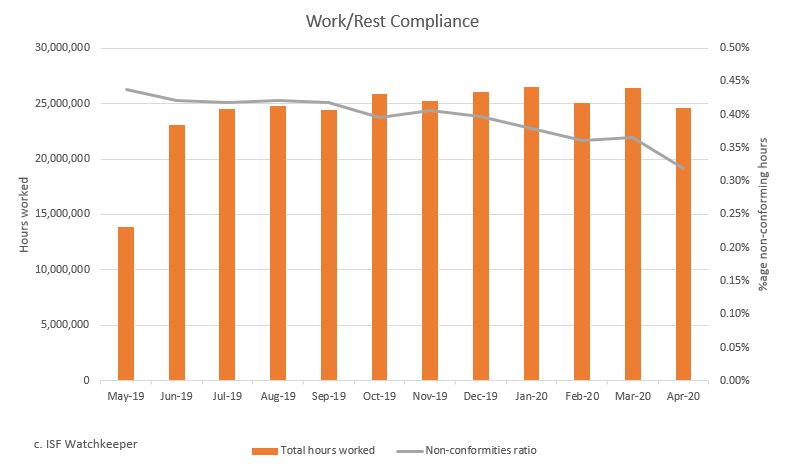 The COVID-19 pandemic is creating significant challenges for ship operators and seafarers, but new research from the International Chamber of Shipping (ICS) has highlighted that, for users of its ISF Watchkeeper software, incidents of non-conformities continue to drop to increasingly lower levels over the past year.
The COVID-19 pandemic is creating significant challenges for ship operators and seafarers, but new research from the International Chamber of Shipping (ICS) has highlighted that, for users of its ISF Watchkeeper software, incidents of non-conformities continue to drop to increasingly lower levels over the past year.
The ICS software, which tracks over 25 million hours of work on board ships undertaken each month by seafarers, has identified that the rate of non-conformances reduced by 25% over the last 12-month period. The trends provide some good news that seafarers appear to still be able to manage shipboard working arrangements in accordance with IMO and ILO regulations during the COVID-19 pandemic.
ICS has been regularly monitoring global seafarer work and rest hour records through its ISF Watchkeeper compliance software, which was first launched to assist the industry in 1997. It is used on over 8,000 ships to provide their operators with evidence of compliance with the international regulations as required by their flag States and Port State Control. This is the first time that such aggregate data has been published by ICS and provides a ray of light during the COVID-19 pandemic.
“Since the beginning of the year seafarers have been faced with significant challenges due to the COVID-19 pandemic, and the difficulty effecting crew changes only exacerbates this situation,” said Guy Platten, Secretary General of the International Chamber of Shipping. “It is good to see that even with all the challenges, it appears that seafarers are still able to get the important rest that they need and the breaks they deserve to mitigate fatigue.
“These results confirm that the world’s shipping community continues to appreciate the importance of safe working practices and compliance, during what have been extremely challenging operating condition for all sectors, and for very many individuals.”
ISF Watchkeeper helps seafarers manage their hours of work and rest on board to ensure that ships can keep delivering the vital supplies we all rely on, without adding further to their burdens. These statistics are drawn from the online version of the software and represent input from 4,000 ships operating across the world.
